May 2023
Effective Methods to Prevent Running Injuries
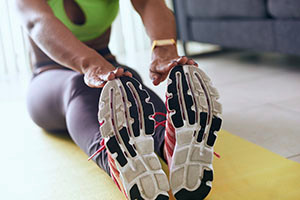
There are several effective stretches that can help to prevent running injuries. For people who enjoy running and jogging, these exercises are often woven into their daily routine. This may be especially true of people that run marathons and who cannot afford to have an injury get in the way of their running goals. A good way to start implementing these practices consists of warming up and cooling down before and after running. People who follow a running program may be less likely to experience an injury, and this may be a result of having a purpose while running. With this in mind, knowing where and when the road will turn, in addition to expecting any hills may help to prevent painful running injuries. It is beneficial to increase speed and mileage gradually, which may avoid heel and calf pain. Many people use a foam roller that can help to strengthen the bottom of the foot, and it can help to perform exercises to increase the range of motion in the feet and legs. If you would like more information about how running injuries can affect the feet and how to prevent them, it is suggested that you consult with a podiatrist who can provide you with useful knowledge.
All runners should take extra precaution when trying to avoid injury. If you have any concerns about your feet, contact Naim G. Shaheed, DPM of Ankle and Foot Centers of Georgia. Our doctor will treat your foot and ankle needs.
How to Prevent Running Injuries
There are a lot of mistakes a runner can make prior to a workout that can induce injury. A lot of athletes tend to overstretch before running, instead of saving those workouts for a post-run routine. Deep lunges and hand-to-toe hamstring pulls should be performed after a workout instead of during a warmup. Another common mistake is jumping into an intense routine before your body is physically prepared for it. You should try to ease your way into long-distance running instead of forcing yourself to rush into it.
More Tips for Preventing Injury
- Incorporate Strength Training into Workouts - This will help improve the body’s overall athleticism
- Improve and Maintain Your Flexibility – Stretching everyday will help improve overall performance
- “Warm Up” Before Running and “Cool Down” Afterward – A warm up of 5-10 minutes helps get rid of lactic acid in the muscles and prevents delayed muscle soreness
- Cross-Training is Crucial
- Wear Proper Running Shoes
- Have a Formal Gait Analysis – Poor biomechanics can easily cause injury
If you have any questions, please feel free to contact one of our offices located in Lithonia/Stonecrest and Emory/Midtown, GA . We offer the newest diagnostic and treatment technologies for all your foot care needs.
Which Type of Arthritis Do I Have?
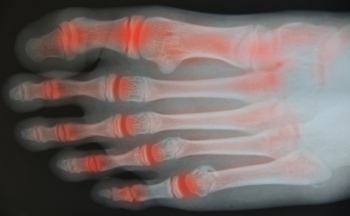
The ankles and feet are responsible for the body’s mobility. Arthritis can affect the joints and range of motion may be limited, as a result of the pain arthritis can cause. There are several kinds of arthritis, and there are a few types that can affect the feet. A degenerative form of arthritis is known as osteoarthritis, or OA, and it tends to happen to people who are middle-aged. A common symptom of the autoimmune disease that is referred to as rheumatoid arthritis, or RA, may lead to incurring a foot deformity, and it is often difficult to walk. An injury may cause post-traumatic arthritis to develop, which causes the cartilage to gradually wear away. Many patients have symptoms of arthritis that can consist of swelling, tenderness, and there may be pain while moving the foot. When the feet are affected by arthritis, patients may lose their sense of balance. If you have foot pain, it is suggested that you consult with a podiatrist who can determine if arthritis is present, and offer you correct treatment solutions.
Arthritis can be a difficult condition to live with. If you are seeking treatment, contact Naim G. Shaheed, DPM from Ankle and Foot Centers of Georgia. Our doctor can provide the care you need to keep you pain-free and on your feet.
Arthritic Foot Care
Arthritis is a joint disorder that involves the inflammation of different joints in your body, such as those in your feet. Arthritis is often caused by a degenerative joint disease and causes mild to severe pain in all affected areas. In addition to this, swelling and stiffness in the affected joints can also be a common symptom of arthritis.
In many cases, wearing ill-fitting shoes can worsen the effects and pain of arthritis. Wearing shoes that have a lower heel and extra room can help your feet feel more comfortable. In cases of rheumatoid arthritis, the arch in your foot may become problematic. Buying shoes with proper arch support that contour to your feet can help immensely.
Alleviating Arthritic Pain
- Exercises that stretch the foot can prevent further pain and injury and increase mobility
- Most of the pain can be alleviated with anti-inflammatory drugs, heat, and topical medications
- Massages can help temporarily alleviate pain.
It is best to see your doctor for the treatment that is right for your needs and symptoms. Conditions vary, and a podiatrist can help you determine the right method of care for your feet.
If you have any questions, please feel free to contact one of our offices located in Lithonia/Stonecrest and Emory/Midtown, GA . We offer the newest diagnostic tools and technology to treat your foot and ankle needs.
Symptoms of Athlete’s Foot
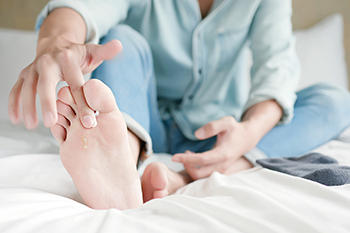
Athlete’s foot is a common and often uncomfortable foot infection caused by having contact with a fungus known as trichophyton. It often affects the space between the toes, and sometimes is found on the bottom of the feet. Unfortunately, it is quite easy to get athlete's foot, which is extremely contagious if certain conditions are met. This fungus thrives in warm and moist places, such as the inside of shoes. Symptoms of athlete’s foot are easy to recognize. The most noticeable signs are itchy toes and dry skin. The infected skin can become chapped and flaked when the shoes are removed and the toes are exposed to dry air. The skin also may begin to ooze fluid, especially if the infection is not treated immediately. The affected area may begin to redden, which is exacerbated by scratching. To make matters worse, the open skin can attract bacteria, further infecting the foot. That may produce swelling, which can be quite painful. At this point, it is suggested that you make an appointment with a podiatrist who can offer an array of treatment options to deal with an athlete’s foot infection.
Athlete’s foot is an inconvenient condition that can be easily reduced with the proper treatment. If you have any concerns about your feet and ankles, contact Naim G. Shaheed, DPM from Ankle and Foot Centers of Georgia. Our doctor will treat your foot and ankle needs.
Athlete’s Foot: The Sole Story
Athlete's foot, also known as tinea pedis, can be an extremely contagious foot infection. It is commonly contracted in public changing areas and bathrooms, dormitory style living quarters, around locker rooms and public swimming pools, or anywhere your feet often come into contact with other people.
Solutions to Combat Athlete’s Foot
- Hydrate your feet by using lotion
- Exfoliate
- Buff off nails
- Use of anti-fungal products
- Examine your feet and visit your doctor if any suspicious blisters or cuts develop
Athlete’s foot can cause many irritating symptoms such as dry and flaking skin, itching, and redness. Some more severe symptoms can include bleeding and cracked skin, intense itching and burning, and even pain when walking. In the worst cases, Athlete’s foot can cause blistering as well. Speak to your podiatrist for a better understanding of the different causes of Athlete’s foot, as well as help in determining which treatment options are best for you.
If you have any questions please feel free to contact one of our offices located in Lithonia/Stonecrest and Emory/Midtown, GA . We offer the newest diagnostic and treatment technologies for all your foot and ankle needs.
Drinking Water and Foot Health During Pregnancy
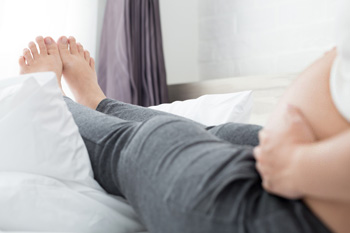
An individual requires a significant amount of water every day. Many people drink far less water than is recommended on a daily basis. This might become problematic during a pregnancy. Pregnant women can reap many health benefits by drinking water daily and staying hydrated. Some of these benefits are linked to foot health. For example, when pregnant women drink a lot of water during pregnancy, this can reduce the amount of salt in the body, which leads to a reduction in puffiness or swelling. Drinking coffee can complicate matters by exacerbating dehydration. If you are pregnant or planning to be, it is suggested that you schedule an appointment with a podiatrist so that you can plan to best protect the health of your feet.
Pregnant women with swollen feet can be treated with a variety of different methods that are readily available. For more information about other cures for swollen feet during pregnancy, consult with Naim G. Shaheed, DPM from Ankle and Foot Centers of Georgia. Our doctor will attend to all of your foot and ankle needs.
What Foot Problems Can Arise During Pregnancy?
One problem that can occur is overpronation, which occurs when the arch of the foot flattens and tends to roll inward. This can cause pain and discomfort in your heels while you’re walking or even just standing up, trying to support your baby.
Another problem is edema, or swelling in the extremities. This often affects the feet during pregnancy but tends to occur in the later stages.
How Can I Keep My Feet Healthy During Pregnancy?
- Wearing orthotics can provide extra support for the feet and help distribute weight evenly
- Minimize the amount of time spent walking barefoot
- Wear shoes with good arch support
- Wear shoes that allow for good circulation to the feet
- Elevate feet if you experience swelling
- Massage your feet
- Get regular, light exercise, such as walking, to promote blood circulation to the feet
If you have any questions please feel free to contact one of our offices located in Lithonia/Stonecrest and Emory/Midtown, GA . We offer the newest diagnostic and treatment technologies for all your foot and ankle needs.
Gout Pain Can Be Managed
Facts About Achilles Tendon Ruptures
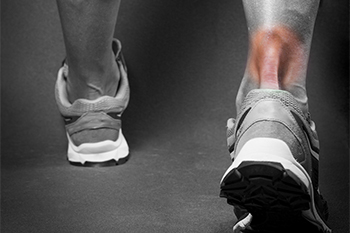
Pain in the back of the heel often indicates a problem with the Achilles tendon, and there are numerous ways this can occur. The top three risk factors for tearing or rupturing this strong tendon are training too hard, pushing off the ground with great force, or a rapid change of direction. While these factors are mainly related to athletic activities, many others can contribute to an Achilles tendon injury. Among them are wearing high heels, having tight or weakened calf muscles, and overpronating when you walk or run. Having high arches, aging, and some types of arthritis can also put you at risk. Ankle instability, taking certain antibiotic medication, and changing the type of surface for an activity are additional risk factors. If you are experiencing any form of ankle pain in the back of the heel that inhibits the completion of your daily activities, it is suggested that you make an appointment with a podiatrist who can discover the cause and treat it.
Achilles tendon injuries need immediate attention to avoid future complications. If you have any concerns, contact Naim G. Shaheed, DPM of Ankle and Foot Centers of Georgia. Our doctor can provide the care you need to keep you pain-free and on your feet.
What Is the Achilles Tendon?
The Achilles tendon is a tendon that connects the lower leg muscles and calf to the heel of the foot. It is the strongest tendon in the human body and is essential for making movement possible. Because this tendon is such an integral part of the body, any injuries to it can create immense difficulties and should immediately be presented to a doctor.
What Are the Symptoms of an Achilles Tendon Injury?
There are various types of injuries that can affect the Achilles tendon. The two most common injuries are Achilles tendinitis and ruptures of the tendon.
Achilles Tendinitis Symptoms
- Inflammation
- Dull to severe pain
- Increased blood flow to the tendon
- Thickening of the tendon
Rupture Symptoms
- Extreme pain and swelling in the foot
- Total immobility
Treatment and Prevention
Achilles tendon injuries are diagnosed by a thorough physical evaluation, which can include an MRI. Treatment involves rest, physical therapy, and in some cases, surgery. However, various preventative measures can be taken to avoid these injuries, such as:
- Thorough stretching of the tendon before and after exercise
- Strengthening exercises like calf raises, squats, leg curls, leg extensions, leg raises, lunges, and leg presses
If you have any questions please feel free to contact one of our offices located in Lithonia/Stonecrest and Emory/Midtown, GA . We offer the newest diagnostic tools and technology to treat your foot and ankle needs.









